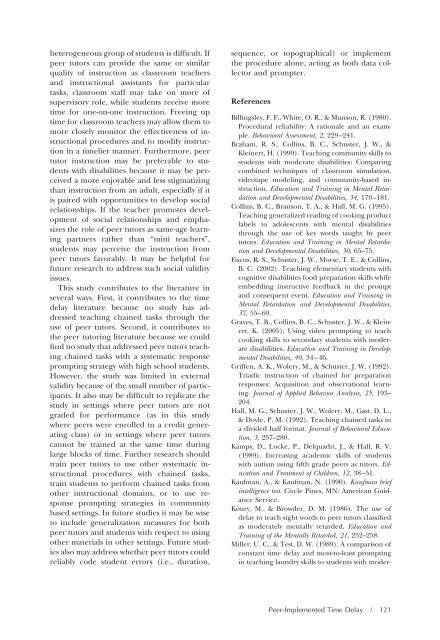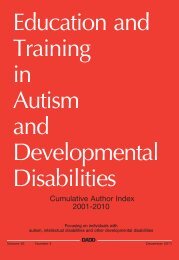Download the Journal (PDF) - Division on Autism and ...
Download the Journal (PDF) - Division on Autism and ...
Download the Journal (PDF) - Division on Autism and ...
You also want an ePaper? Increase the reach of your titles
YUMPU automatically turns print PDFs into web optimized ePapers that Google loves.
heterogeneous group of students is difficult. If<br />
peer tutors can provide <str<strong>on</strong>g>the</str<strong>on</strong>g> same or similar<br />
quality of instructi<strong>on</strong> as classroom teachers<br />
<strong>and</strong> instructi<strong>on</strong>al assistants for particular<br />
tasks, classroom staff may take <strong>on</strong> more of<br />
supervisory role, while students receive more<br />
time for <strong>on</strong>e-<strong>on</strong>-<strong>on</strong>e instructi<strong>on</strong>. Freeing up<br />
time for classroom teachers may allow <str<strong>on</strong>g>the</str<strong>on</strong>g>m to<br />
more closely m<strong>on</strong>itor <str<strong>on</strong>g>the</str<strong>on</strong>g> effectiveness of instructi<strong>on</strong>al<br />
procedures <strong>and</strong> to modify instructi<strong>on</strong><br />
in a timelier manner. Fur<str<strong>on</strong>g>the</str<strong>on</strong>g>rmore, peer<br />
tutor instructi<strong>on</strong> may be preferable to students<br />
with disabilities because it may be perceived<br />
a more enjoyable <strong>and</strong> less stigmatizing<br />
than instructi<strong>on</strong> from an adult, especially if it<br />
is paired with opportunities to develop social<br />
relati<strong>on</strong>ships. If <str<strong>on</strong>g>the</str<strong>on</strong>g> teacher promotes development<br />
of social relati<strong>on</strong>ships <strong>and</strong> emphasizes<br />
<str<strong>on</strong>g>the</str<strong>on</strong>g> role of peer tutors as same-age learning<br />
partners ra<str<strong>on</strong>g>the</str<strong>on</strong>g>r than “mini teachers”,<br />
students may perceive <str<strong>on</strong>g>the</str<strong>on</strong>g> instructi<strong>on</strong> from<br />
peer tutors favorably. It may be helpful for<br />
future research to address such social validity<br />
issues.<br />
This study c<strong>on</strong>tributes to <str<strong>on</strong>g>the</str<strong>on</strong>g> literature in<br />
several ways. First, it c<strong>on</strong>tributes to <str<strong>on</strong>g>the</str<strong>on</strong>g> time<br />
delay literature because no study has addressed<br />
teaching chained tasks through <str<strong>on</strong>g>the</str<strong>on</strong>g><br />
use of peer tutors. Sec<strong>on</strong>d, it c<strong>on</strong>tributes to<br />
<str<strong>on</strong>g>the</str<strong>on</strong>g> peer tutoring literature because we could<br />
find no study that addressed peer tutors teaching<br />
chained tasks with a systematic resp<strong>on</strong>se<br />
prompting strategy with high school students.<br />
However, <str<strong>on</strong>g>the</str<strong>on</strong>g> study was limited in external<br />
validity because of <str<strong>on</strong>g>the</str<strong>on</strong>g> small number of participants.<br />
It also may be difficult to replicate <str<strong>on</strong>g>the</str<strong>on</strong>g><br />
study in settings where peer tutors are not<br />
graded for performance (as in this study<br />
where peers were enrolled in a credit generating<br />
class) or in settings where peer tutors<br />
cannot be trained at <str<strong>on</strong>g>the</str<strong>on</strong>g> same time during<br />
large blocks of time. Fur<str<strong>on</strong>g>the</str<strong>on</strong>g>r research should<br />
train peer tutors to use o<str<strong>on</strong>g>the</str<strong>on</strong>g>r systematic instructi<strong>on</strong>al<br />
procedures with chained tasks,<br />
train students to perform chained tasks from<br />
o<str<strong>on</strong>g>the</str<strong>on</strong>g>r instructi<strong>on</strong>al domains, or to use resp<strong>on</strong>se<br />
prompting strategies in community<br />
based settings. In future studies it may be wise<br />
to include generalizati<strong>on</strong> measures for both<br />
peer tutors <strong>and</strong> students with respect to using<br />
o<str<strong>on</strong>g>the</str<strong>on</strong>g>r materials in o<str<strong>on</strong>g>the</str<strong>on</strong>g>r settings. Future studies<br />
also may address whe<str<strong>on</strong>g>the</str<strong>on</strong>g>r peer tutors could<br />
reliably code student errors (i.e., durati<strong>on</strong>,<br />
sequence, or topographical) or implement<br />
<str<strong>on</strong>g>the</str<strong>on</strong>g> procedure al<strong>on</strong>e, acting as both data collector<br />
<strong>and</strong> prompter.<br />
References<br />
Billingsley, F. F., White, O. R., & Muns<strong>on</strong>, R. (1980).<br />
Procedural reliability: A rati<strong>on</strong>ale <strong>and</strong> an example.<br />
Behavioral Assessment, 2, 229–241.<br />
Braham, R. S., Collins, B. C., Schuster, J. W., &<br />
Kleinert, H. (1999). Teaching community skills to<br />
students with moderate disabilities: Comparing<br />
combined techniques of classroom simulati<strong>on</strong>,<br />
videotape modeling, <strong>and</strong> community-based instructi<strong>on</strong>.<br />
Educati<strong>on</strong> <strong>and</strong> Training in Mental Retardati<strong>on</strong><br />
<strong>and</strong> Developmental Disabilities, 34, 170–181.<br />
Collins, B. C., Brans<strong>on</strong>, T. A., & Hall, M. G. (1995).<br />
Teaching generalized reading of cooking product<br />
labels to adolescents with mental disabilities<br />
through <str<strong>on</strong>g>the</str<strong>on</strong>g> use of key words taught by peer<br />
tutors. Educati<strong>on</strong> <strong>and</strong> Training in Mental Retardati<strong>on</strong><br />
<strong>and</strong> Developmental Disabilities, 30, 65–75.<br />
Fiscus, R. S., Schuster, J. W., Morse, T. E., & Collins,<br />
B. C. (2002). Teaching elementary students with<br />
cognitive disabilities food preparati<strong>on</strong> skills while<br />
embedding instructive feedback in <str<strong>on</strong>g>the</str<strong>on</strong>g> prompt<br />
<strong>and</strong> c<strong>on</strong>sequent event. Educati<strong>on</strong> <strong>and</strong> Training in<br />
Mental Retardati<strong>on</strong> <strong>and</strong> Developmental Disabilities,<br />
37, 55–69.<br />
Graves, T. B., Collins, B. C., Schuster, J. W., & Kleinert,<br />
K. (2005). Using video prompting to teach<br />
cooking skills to sec<strong>on</strong>dary students with moderate<br />
disabilities. Educati<strong>on</strong> <strong>and</strong> Training in Developmental<br />
Disabilities, 40, 34–46.<br />
Griffen, A. K., Wolery, M., & Schuster, J. W. (1992).<br />
Triadic instructi<strong>on</strong> of chained for preparati<strong>on</strong><br />
resp<strong>on</strong>ses: Acquisiti<strong>on</strong> <strong>and</strong> observati<strong>on</strong>al learning.<br />
<str<strong>on</strong>g>Journal</str<strong>on</strong>g> of Applied Behavior Analysis, 25, 193–<br />
204.<br />
Hall, M. G., Schuster, J. W., Wolery, M., Gast, D. L.,<br />
& Doyle, P. M. (1992). Teaching chained tasks in<br />
a divided half format. <str<strong>on</strong>g>Journal</str<strong>on</strong>g> of Behavioral Educati<strong>on</strong>,<br />
3, 257–280.<br />
Kamps, D., Locke, P., Delquadri, J., & Hall, R. V.<br />
(1989). Increasing academic skills of students<br />
with autism using fifth grade peers as tutors. Educati<strong>on</strong><br />
<strong>and</strong> Treatment of Children, 12, 38–51.<br />
Kaufman, A., & Kaufman, N. (1990). Kaufman brief<br />
intelligence test. Circle Pines, MN: American Guidance<br />
Service.<br />
Koury, M., & Browder, D. M. (1986). The use of<br />
delay to teach sight words to peer tutors classified<br />
as moderately mentally retarded. Educati<strong>on</strong> <strong>and</strong><br />
Training of <str<strong>on</strong>g>the</str<strong>on</strong>g> Mentally Retarded, 21, 252–258.<br />
Miller, U. C., & Test, D. W. (1989). A comparis<strong>on</strong> of<br />
c<strong>on</strong>stant time delay <strong>and</strong> most-to-least prompting<br />
in teaching laundry skills to students with moder-<br />
Peer-Implemented Time Delay / 121
















